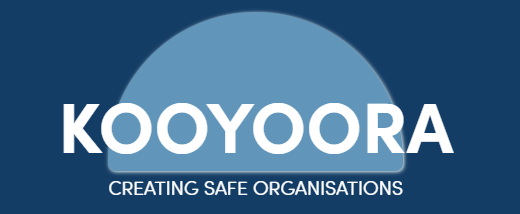Kooyoora Launches Abuse Prevention Through Culture Change Framework
We are excited to announce the official launch of Kooyoora’s Abuse Prevention through Culture Change Framework. This significant milestone represents the culmination of a journey that began with insightful conversations and a shared vision to combat abuse and safeguard vulnerable individuals.
At the heart of this initiative is our CEO, Fiona Boyle, whose commitment to improving safeguarding practices has driven this project forward.
The Journey to Creating the Framework
The journey began with Fiona engaging in conversations with a group of like-minded professionals from the fields of safeguarding and child abuse research. Among them were Daryl Higgins and Tim Moore from Australian Catholic University (ACU), as well as Laura Lindsay from Glasshouse Safeguarding.
Through these discussions, the team recognised the need for an initiative that could provide practical support to organisations striving to prevent harm. A shared goal emerged: to create an accessible framework that could assist organisations in improving their safeguarding practices and preventing abuse.
Research and Insights: Understanding the Underlying Causes of Abuse
In collaboration with these experts, the team at Kooyoora identified a valuable opportunity through a grant program run by the National Centre for Action on Child Sexual Abuse.
After identifying prevention as a key area for research and improvement, Kooyoora successfully secured a grant of $35,000. This funding enabled us to delve deeper into the issue and find a sustainable way forward for organisations to implement meaningful change.
To further this goal, we enlisted Angie Muccillo to conduct a comprehensive literature review. This review focused on understanding the underlying drivers that contribute to abuse within organisations.
By analysing existing research, Angie explored key factors such as:
Institutional culture
Power dynamics
Systemic barriers preventing organisations from adopting effective safeguarding measures.
The findings from the literature review were instrumental in shaping the development of the Abuse Prevention through Culture Change Framework.
Introducing the Abuse Prevention through Culture Change Framework
The framework is designed to help organisations:
Understand their existing culture
Identify cultural risks that may contribute to harm
Develop strategies to make lasting changes
The tools within the framework provide practical guidance for organisations seeking to foster safer, more supportive environments for their staff, clients, and communities.
At its core, the framework is built on the belief that effective abuse prevention is not just about implementing isolated policies or procedures but requires a cultural shift—one that prioritises:
Transparency
Accountability
Ongoing education
By focusing on cultural change, the framework seeks to empower organisations to build sustainable practices that reduce the risk of harm and promote a culture of safety.
Looking Ahead: Continuing Our Mission
This project is just the beginning. As we continue to refine and improve the framework, we are committed to supporting organisations in their efforts to prevent abuse and ensure the wellbeing of those in their care.
The launch of the Abuse Prevention through Culture Change Framework is a significant step forward in our mission to create safer and more supportive communities. We look forward to seeing the positive impact this framework will have as it is implemented across various sectors, ultimately making a difference in the lives of individuals and organisations alike.
Kooyoora is proud to be at the forefront of this critical work, and we are excited to share our framework with the world.
“Together, we can foster a culture of safety, respect, and accountability that helps prevent abuse and supports those who are most vulnerable.”
Our Partners in This Project
Australian Catholic University – Institute of Child Protection Studies
Professor Daryl Higgins - Director of the Institute of Child Protection Studies. His research focuses on public health approaches to protecting children, and child-safe organisational strategies. A registered psychologist, Prof Higgins has been researching child abuse impacts and prevention, family violence and family functioning for nearly 30 years.
Associate Professor Tim Moore - Deputy Director at the Institute of Child Protection Studies. He is an internationally recognised child and youth researcher and children's rights advocate. His research spans two decades, addressing issues such as homelessness, youth justice, child protection, residential care, young carers, and child sexual abuse prevention.
Jacqui Stewart - Program Manager with the Institute of Child Protection Studies. She supports the successful delivery of applied research, training, and engagement projects within the Institute. Jacqui specialises in monitoring, evaluation and learning (MEL).
Laura Lindsay – Glasshouse Safeguarding
Laura founded GlassHouse Safeguarding to collaborate with individuals and organisations on safeguarding consultancy, training, partnerships, and projects related to child sexual abuse and exploitation. Laura has over 20 years’ experience working across different sectors, including community services, out-of-home care, education, and faith-based settings. Laura also brought a lived experience lens to the project as a survivor of institutional abuse. Recently, Laura wound up her consultancy practice and commenced working as a Counsellor at the Gippsland Centre Against Sexual Assault.
Our Advisory Committee Members
Fiona Boyle – CEO, Kooyoora
Daryl Higgins – Director, Institute of Child Protection Studies, ACU
Laura Lindsay – Director, Glasshouse Safeguarding
Debra Manning – Retired University Lecturer & Social Worker
Ami Summer – Director, Craft Coaching and Development
Anna Doganieri – Project Coordinator, Kooyoora


